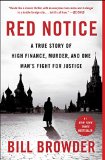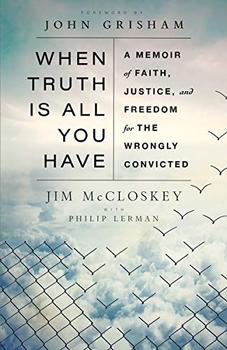Summary | Excerpt | Reviews | Beyond the book | Read-Alikes | Genres & Themes | Author Bio

A True Story of High Finance, Murder, and One Man's Fight for Justice
by Bill BrowderThe dissolution of the USSR in 1991 opened new doors to foreign investment. Bill Browder, a young and aspiring entrepreneur, sought to take advantage of the emerging Russian markets and so in 1996 formed Hermitage Capital Management, an investment and asset management firm focused on the country's economy. Red Notice chronicles his career as he made and lost fortunes and eventually ended up on the wrong side of some very powerful men.
The book is really comprised of two parts. The first 150 pages or so relate Browder's adventures (and misadventures) as he established himself in the world of high finance. Told with a self-deprecating charm and sense of humor, the story of the author's formative years is involving without becoming too technical for the layperson. It's exceptionally entertaining and as the monetary stakes rise to astronomical levels, the narrative starts to resemble a high-speed fictional thriller. It's rare that I'd call a non-fiction account a page-turner, but in this case the description is apt.
The second part of the book becomes darker as Browder describes how his firm began uncovering corruption in the financing of Russian corporations, which benefited a small cadre of officials at the expense of the country's citizens. As the author and his legal team exposed this exploitation, their actions had increasingly serious repercussions, eventually resulting in the incarceration, torture and death of Sergei Magnitsky, one of Hermitage's lawyers. Browder subsequently decided to enlist the help of American politicians to raise awareness of the ongoing human rights abuses perpetrated by the Russian government - an effort that continues today. This section is as engrossing as the first half in spite of the somewhat slow pace as the author navigates the complexities of the U.S. political scene.
Although Red Notice is set firmly in the realm of finance and politics, Browder successfully weaves a human element into the tapestry to create a truly moving tribute to Magnitsky and his family. My attention was also completely absorbed by the author's straightforward storytelling and I appreciated his ability to present complicated financial and political topics in a way that was both accessible and interesting. For example, I remember learning the complex path an idea takes on its way to becoming a law - and being bored to tears by the process, in high school civics class. Browder covers this territory with such a personal slant and so much emotion that it's more like following a sporting event; I found myself inwardly cheering as each hurdle was overcome.
I generally approach first-person accounts with a healthy amount of skepticism, since naturally the author's personal "spin" comes into play, and often readers are getting only one side of the story. However, as the book progresses it becomes clear that the circumstances Browder portrays have been thoroughly vetted by both politicians and journalists, and as a result the account leaves little room for doubt that events occurred as described.
I did enjoy the book – very much, in fact – but at the same time, as a reader, I felt a little bit used. As the narrative moves along, it begins to resemble a high-stakes chess match, with each side making a move calculated to figuratively inflict damage on the opponent. It's not to say that Browder's crusade is unjustified in any way, but this story feels like his next step in upping the ante, and that by reading it I've become an unwilling participant in someone else's battle. This impression may be exacerbated by the sense that the conflict isn't resolved - that there's more to come - and so the book feels premature in some respects.
High finance and politics may not be among many readers' first choices when making a non-fiction selection, so I do wonder what type of audience Red Notice will attract. I hope that it will bring people out of their comfort zones, though, as it's a compelling narrative that deserves a wide readership. It's accessible enough that people who generally prefer fiction will almost certainly find that it will keep them entertained, and the subject matter is important enough that it will likely resonate with those who prefer books about social issues.
![]() This review was originally published in The BookBrowse Review in February 2015, and has been updated for the
November 2015 edition.
Click here to go to this issue.
This review was originally published in The BookBrowse Review in February 2015, and has been updated for the
November 2015 edition.
Click here to go to this issue.

If you liked Red Notice, try these:

by Jim McCloskey, Philip Lerman
Published 2021
By the founder of the first organization in the United States committed to freeing the wrongly imprisoned, a riveting story of devotion, sacrifice, and vindication.

by Jake Halpern
Published 2015
A vital exposé that is also a bravura feat of storytelling.
Your guide toexceptional books
BookBrowse seeks out and recommends the best in contemporary fiction and nonfiction—books that not only engage and entertain but also deepen our understanding of ourselves and the world around us.